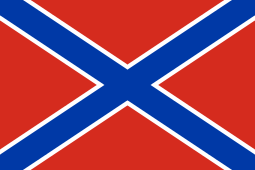Novorossiya (confederation)
Novorossiya, Novorussia or New Russia (Russian: Новороссия, tr. Novorossiya, IPA: [nəvɐˈrosʲɪjə]; Ukrainian: Новоросія, romanized: Novorosiya), also referred to as the Union of People's Republics (Russian: Сою́з наро́дных респу́блик, tr. Soyuz Narodnykh Respublik, IPA: [sɐˈjus nɐˈrodnɨx rʲɪˈspublʲɪk]; Ukrainian: Союз народних республік, Soyuz Narodnykh Respublik), was a proposed confederation of the self-proclaimed Donetsk People's Republic (DPR) and Luhansk People's Republic (LPR) in eastern Ukraine, both of which are under the control of pro-Russian separatists.[8]
Federal State of Novorossiya | |||||||||||||
|---|---|---|---|---|---|---|---|---|---|---|---|---|---|
| 2014–2015 | |||||||||||||
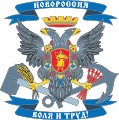 Coat of arms
| |||||||||||||
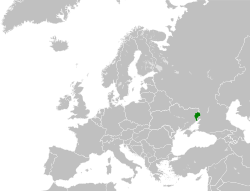 Location of Novorossiya in Europe (dark green) | |||||||||||||
| Status | Confederation of unrecognized states | ||||||||||||
| Largest city | Donetsk | ||||||||||||
| Official languages | Russian, Ukrainian | ||||||||||||
| Religion | Russian Orthodox (official)[2] | ||||||||||||
| Membership | |||||||||||||
| Government | Provisional confederation | ||||||||||||
• Speaker of the Parliament | Oleg Tsaryov[3] | ||||||||||||
• Head of the DPR | Denis Pushilin | ||||||||||||
• Head of the LPR | Leonid Pasechnik | ||||||||||||
| Historical era | Russo-Ukrainian War | ||||||||||||
• Declared | 22 May 2014 | ||||||||||||
• Suspended | 20 May 2015 | ||||||||||||
| Area | |||||||||||||
• Total | 16,800[4] km2 (6,500 sq mi) | ||||||||||||
| Population | |||||||||||||
• Estimate | 3,766,483[5][6] | ||||||||||||
• Density | 224/km2 (580.2/sq mi) | ||||||||||||
| GDP (nominal) | 2015 estimate | ||||||||||||
• Total | ~US$10 billion | ||||||||||||
• Per capita | ~US$3,000 | ||||||||||||
| Currency | Russian ruble | ||||||||||||
| Time zone | UTC+3 (Moscow Time[7]) | ||||||||||||
| Driving side | right | ||||||||||||
| |||||||||||||
At present, the two constituent republics of the proposed confederation have no diplomatic recognition, and Ukraine has classified them as terrorist organizations and refers to their territory as the Anti-Terrorist Operation Zone.[9][10] The creation of Novorossiya was declared on 22 May 2014,[2][11] and one month later spokespeople of both republics declared their merger into a confederal "Union of People's Republics".[12] Within a year, the project was suspended: on 1 January 2015, founding leadership announced the project has been put on hold, and on 20 May the constituent members announced the freezing of the political project.[13][14]
Background
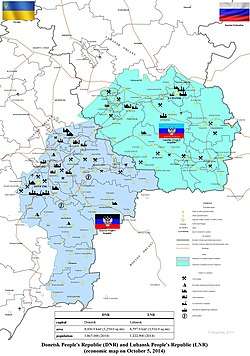
Novorossiya was the name of a territory of the Russian Empire formed from the Crimean Khanate and Zaporizhian Sich which was under a mutual condominium of the Russian Empire and the Polish-Lithuanian Commonwealth. The territory had been annexed several years after the Treaty of Küçük Kaynarca concluded the Russo-Turkish War in 1774. Novorossiya initially included today's Southern Ukraine as well as some parts of today's Russia such as Kuban. The modern Russian Black Sea coast that was occupied by indigenous Circassians under military protection of the Ottoman Empire was not conquered until 1829 and was ceded to Russia under the 1829 Treaty of Adrianople.
The region was soon colonized by Ukrainian, Romanian, Russian, German, Greek, Bulgarian, Jewish and other settlers. The major cities were Odessa, Kherson, Mykolaiv, and Novorossiysk. In 1802 the province of Novorossiya was split into three Governorates.
Most of 18th century Novorossiya was incorporated in 1917 into the newly proclaimed Ukrainian People's Republic because ethnic Ukrainians constituted the majority of the population. After the defeat of pro-independence Ukrainians in the Ukrainian–Soviet War, the Soviet government confirmed that Southern Ukraine was part of the Ukrainian Soviet Socialist Republic.
The Novorossiya movement made its appearance in Odessa in August 1990. The movement, known as the Democratic Union of Novorossiya, argued that given the separate ethnos of the region it should have an autonomous status within a federated Ukrainian state. It campaigned for 'special state status' within 'the historical boundaries of Novorossiya (at the time Odessa, Mykolaiv, Kherson, Dnipropetrovsk, and Crimean Oblasts, and also part of the Dniester region of the Moldavian SSR).[15] It failed, however, to gain popular support.[16]
In September 1990 Alexander Solzhenitsyn published an article in opposition to the cultural partition of Ukraine and Russia in which he references 'Novorossiya', i.e., "including those regions which have never been part of the traditional Ukraine: the 'wild steppe' of the nomads—the latter "New Russia" [Новороссия]--as well as the Crimea, the Donbass area, and the lands stretching east almost to the Caspian Sea". He argues that "self-determination of peoples" requires that a nation must resolve issues of identity for itself.[17]
By November 1991 representatives from the Odessa, Kherson, Mykolaiv and Crimean oblasts had met in Odessa to discuss the question of forming a new state, 'Novorossiya'. This was necessitated, they explained, by the growth of 'nationalist tendencies' in Ukraine, its increasing isolationism, and diminishing ties with Russia.[18]
Three days after the 1 December 1991 referendum on Ukrainian independence, the mayor of St Petersburg, Anatoly Sobchak, argued that Russia had handed over to Ukraine "a whole series of Russian provinces, the so-called Novorossiya, whose population is for the most part Russian" and that the Russian minority in Ukraine was threatened with forcible 'Ukrainianisation'.[19] Following the collapse of the Soviet Union[20] the term Novorossiya began to be used again in calls for the independence or secession of regions of Ukraine corresponding to different areas.[21]
As late as September 1992, in Odessa, several organizations such as the Civic Movement of Odessa, Rus', the Socialist Party, and Novorossia are campaigning for the establishment of a separate Novorossian region, the exact borders of which were still being debated.[22]
In June 1994 the chairman of the Dniester Republic's supreme council made reference to Crimea, Odessa, and other oblasts as "Novorossiya".[23]
Dmitry Trenin of the Carnegie Moscow Center wrote that in 2005 and again in 2008 some quarters in Moscow, that were not entirely academic, discussed the idea of a Russia-friendly buffer state, "Novorossiya", being formed out of southern Ukraine from the Crimea to Odessa in response to perceived Western penetration into the former Soviet Union.[24]
The term Novorossiya came into usage in 2014 among Antimaidan protesters following the Euromaidan Ukrainian Revolution.[21]
On 17 April 2014, during talks in Geneva on resolving the rising unrest in southern and eastern Ukraine, President Putin stated at a question and answer session that even "in the tsarist days – Kharkov, Lugansk, Donetsk, Kherson, Nikolayev and Odessa – were not part of Ukraine"[25] but part of Novorossiya, and that they had been irresponsibly ceded to Ukraine.[25][26][nb 1]
On 29 August 2014 President Putin issued a statement addressed to the "Militia of Novorossiya" calling upon it to show humanitarian compassion and allow surrounded Ukrainian soldiers to withdraw and reunite with their families. This was the last official statement by President Putin addressing "Novorossiya".[29]
History
Formation
The New Russia Party, founded on 13 May 2014 in Donetsk, Ukraine,[30] declared on its first congress of 22 May 2014 the formation of a new self-declared state named 'Novorossiya', inspired by the historical region of the Russian Empire that carried that name. The congress was attended by separatist officials of the Donetsk People's Republic, Donbass People's Militia as well as by the Donetsk Republic leader Pavel Gubarev, ultranationalist/Stalinist writer Alexander Prokhanov,[31] nationalist bolshevist political scientist and Eurasia Party leader Aleksandr Dugin, and Valery Korovin.[32][33] According to Gubarev the state would include Kharkiv[nb 2], Kherson, Dnipropetrovsk, Mykolaiv, Odessa and Zaporizhia.[36][37] Two days later, the self-appointed 'Prime Minister' of Donetsk Alexander Borodai and Luhansk "head of the Republic" Aleksey Karyakin signed a document behind closed doors formalizing their merger into the new confederation.[38]
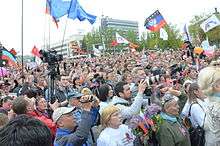
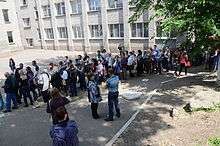
In an interview on 31 May, Denis Pushilin, then acting as head of state of the Donetsk People's Republic, stated that Novorossiya currently existed as a union of people's republics, but cooperation could be deepened if more territories were to join.[39] On 24 June, the two People's Republics proclaimed their accession to the union of people's republics, and at the second plenum of the new Parliament of Novorossiya on 15 July, the confederation adopted the official name of Novorossiya.[40] Since 2 November 2014 Donbass parliamentary elections the Parliament did not gather anymore.[13]
Parallel December 2014 declaration
On 12 December 2014, a "Congress of Deputies of All Levels" led by former DPR deputy foreign minister Boris Borisov, alongside figures such as Pavel Gubarev, issued a renewed declaration of the state sovereignty of the "Union of Sovereign Republics" of Novorossiya, claiming it to be an amendment of the 1922 Treaty on the Creation of the USSR.[41][42] In contrast to the May agreement, the new declaration aimed to build a new executive "from scratch".[42] An official of the DPR responded that although Borisov was well-intentioned, his initiative did not have the material backing necessary for success.[42]
Suspension of the project
On 20 May 2015 supporters of the LNR and the DNR officially announced the freezing of the "New Russia" project and the closure of the related structures of political technology. Oleg Tsarev, chairman of the movement "New Russia" said that the activities of the Joint Parliament of Novorossiya are frozen because the confederation did not comply with the Minsk II accords.[13][43] On 11 May 2014, a referendum on self-determination in eight regions (Dnipropetrovsk, Zaporizhia, Odessa, Luhansk, Mykolaiv, Kharkiv, Kherson, and Donetsk) was not held as expected, but only in the Lugansk and Donetsk republics. On 24 May 2014, delegates from these eight regions created the Joint Parliament of New Russia; however, this proved to be only virtual in nature as the political structure was unclaimed: the expected delegation of representatives did not occur, leading to curtailment of the Parliament initiative.
The status of Novorossiya came into dispute on 26 May 2014, when according to Bolotov, "none of the agreements have been concluded" but the intention is to form a "Union of People's Republics".[44] On 1 January 2015, former Donetsk Republic Prime Minister Alexander Borodai, who resigned on 7 August 2014,[45][46] stated that "there is no Novorossiya" and that the proposed state was a "dream that was not brought to life" and called it a false start.[47] On 8 June 2015, the leaders of DPR and LPR submitted their proposed changes to the Constitution of Ukraine that, while calling for wide autonomy of the Donbass region, conceded them as territories of Ukraine. No change was proposed regarding the status of the Autonomous Republic of Crimea as part of Ukraine, considering the status of Crimea outside their purview. This was imputed by news agencies as a recognition by the leaders of DPR and LPR of Ukrainian sovereignty over Crimea.[48] Given this interpretation, these changes were withdrawn within hours,[49] and on 15 June 2015, DPR "Prime Minister" Alexander Zakharchenko claimed that the DPR "will never be part of Ukraine".[50][51]
In mid-June 2015, Igor Girkin said that the situation in Novorossiya was a "colossal failure" no one knew how to patch up, and that the plan was to negotiate the return of the autonomous regions of Donetsk and Lugansk to Ukraine in return for Ukraine's de facto acceptance of the annexation of Crimea to the Russian Federation, the gradual withdrawal of sanctions, and the return of all other territories to their previous condition. According to Girkin, should such a "wonderful" plan be realised, Ukraine would become a federal state. "Consequently, in such a manner, a safety catch would be put in place for its entry into NATO. Russia would get leverage over Kiev in the form of the autonomous regions, and everything would settle down."[52] On 9 June 2016, an anonymous Russian businessman averred that the shooting down of Malaysia Airlines Flight 17 forfeited any chance to create the confederation.[53]
Similar proposal
A project was declared on 18 July 2017 by the Donetsk People's Republic to include all of Ukraine, but the name was changed to "Malorossiya" (Little Russia).[54][55] The Luhansk People's Republic however stated that it would not be taking part in the project. The announcement was widely condemned by nations including Russia which pointed to the Minsk agreement.[56]
Military
The armed forces of Novorossiya were composed of the Donbass People's Militia[57][58] and the LPR People's Militia (formerly known as Army of the South-East).
The militias of the Donetsk People's Republic and Luhansk People's Republic, merged into one force on 16 September 2014, forming the "United Armed Forces of Novorossiya".[59]
It is regarded as a terrorist group by the Ukrainian Government, and was accused in the downing of Malaysia Airlines Flight 17 on 17 July 2014.
International recognition
No sovereign state of the United Nations has recognized Novorossiya as a sovereign state or political entity. The two constituent republics, the Luhansk People's Republic and the Donetsk People's Republic, were recognized on 18 and 27 June 2014 respectively by the disputed territory of South Ossetia.[60][61]
Controversy
Russian dissidents Alexandr Skobov and Andrey Piontkovsky commented that in its political features (nationalism, imperialism) the entity has similarities to 20th-century fascist movements.[62][63]
See also
| Wikimedia Commons has media related to Federal State of New Russia. |
- 2014 pro-Russian conflict in Ukraine
- United Armed Forces of Novorossiya
- War in Donbass
- Pavel Gubarev
- Donetsk–Krivoy Rog Soviet Republic
- Donbass
- South-East Ukrainian Autonomous Republic
- List of active separatist movements in Europe
- List of active rebel groups
- 2014 Crimean crisis
Notes
- The city of Kharkiv was not part of the historical region of Novorossiya; but of the historical region Sloboda Ukraine.[27][28]
- The city of Kharkiv was not part of the historical region of Novorossiya; but of the historical region Sloboda Ukraine.[34][35]
References
- "Факел Новороссии – Воля и труд!". Wikireading.ru. Archived from the original on 12 June 2019. Retrieved 12 June 2019.
- Babiak, Mat (22 May 2014). "Welcome to New Russia". Ukrainian Policy. Archived from the original on 8 June 2014. Retrieved 26 May 2014.
- "Federal State of Novorossiya / Union of People's Republics". Archived from the original on 9 August 2014. Retrieved 8 August 2014.
- https://www.arcgis.com/apps/Cascade/index.html?appid=8dad6c865bed491ead3190c7ffb2fafe |retrieved= 12 April 2020
- "Archived copy" (PDF). Archived (PDF) from the original on 16 May 2018. Retrieved 25 October 2018.CS1 maint: archived copy as title (link)
- "Archived copy" (PDF). Archived (PDF) from the original on 26 May 2018. Retrieved 25 October 2018.CS1 maint: archived copy as title (link)
- "DPR and LPR switch over to Moscow time". ITAR-TASS. 26 October 2014. Archived from the original on 20 February 2015. Retrieved 28 October 2014.
- "'Many Russians' fighting in Ukraine". 28 August 2014. Retrieved 22 April 2019.
- "Ukraine's prosecutor general classifies self-declared Donetsk and Luhansk republics as terrorist organizations". Kyiv Post. 16 May 2014. Archived from the original on 14 July 2015. Retrieved 14 July 2015.
- Самопроголошені республіки у Донецькій та Луганській областях кваліфіковано як терористичні організації [The self-proclaimed republics in the Donetsk and Lugansk oblasts classified as terrorist organizations] (in Ukrainian). Official website of the General Prosecutor of Ukraine. 16 May 2015. Archived from the original on 14 July 2015. Retrieved 14 July 2015.
- "Donetsk, Lugansk People's Republics unite in Novorossiya". Voice of Russia. 24 May 2014. Archived from the original on 7 June 2014. Retrieved 26 May 2014.
- Babiak, Mat (24 June 2014). "Terrorist organizations declare New Russian "Union of People's Republics"". Euromaidan Press. Archived from the original on 14 July 2014. Retrieved 25 June 2014.
- "Russian-backed 'Novorossiya' breakaway movement collapses". Ukraine Today. 20 May 2015. Archived from the original on 21 May 2015. Retrieved 20 May 2015.
Vladimir Dergachev; Dmitriy Kirillov (20 May 2015). Проект «Новороссия» закрыт [Project "New Russia" is closed]. Gazeta.ru (in Russian). Archived from the original on 22 May 2015. Retrieved 20 May 2015. - "Why the Kremlin Is Shutting Down the Novorossiya Project". Carnegie Endowment for International Peace. Archived from the original on 22 December 2015. Retrieved 20 December 2015.
- Roman Solchanyk (1994). "The politics of state building: Centre‐periphery relations in Post‐Soviet Ukraine". Europe-Asia Studies. 46 (1): 59. doi:10.1080/09668139408412149.
- Patrick Heenan; Monique Lamontagne, eds. (1999). The CIS Handbook. Chicago and London: Fitzroy Dearborn. p. 75.
- Солжени́цын, Алекса́ндр. "Как нам обустроить Россию, подзаголовок посильные соображения", Литературной газете и Комсомольской правде, Дата: июль 1990; Дата первой публикации:сентябрь 1990. On-line copy: http://www.kulichki.com/inkwell/text/hudlit/ruslit/solzheni/kak_obustroit.htm Archived 4 October 2015 at the Wayback Machine. English translation: Solzhenitsyn, Alexander. "Rebuilding Russia, Reflections and Tentative Proposals", Translated by Alexis Klimoff, Harvill, An Imprint of HaperCollinsPublishers, 1991, p.19
- Roman Solchanyk (1994). "The politics of state building: Centre‐periphery relations in Post‐Soviet Ukraine". Europe-Asia Studies. 46 (1): 60. doi:10.1080/09668139408412149.
- Roman Solchanyk (1994). "The politics of state building: Centre‐periphery relations in Post‐Soviet Ukraine". Europe-Asia Studies. 46 (1): 48. doi:10.1080/09668139408412149.
- Ст. Донецко-Криворожская советская республика (in Russian) (Большой энциклопедический словарь / Гл. ред. А. М. Прохоров. Изд. 2-е, перераб. и доп. – 2000 ed.). Archived from the original on 30 November 2012. Retrieved 3 July 2014.
- Kinstler, Linda (7 April 2014). "Protesters in Eastern Ukraine Are Chanting "Novorossiya", an Old Term That's Back in Vogue". The New Republic. Archived from the original on 19 April 2014. Retrieved 26 May 2014.
- "Federal State of Novorossiya Union of People's Republics". Globalsecurity.org. 27 May 2015. Archived from the original on 12 July 2015. Retrieved 14 July 2015.
- Zbigniew Brzezinski; Paige Sullivan; Center for Strategic and International Studies (Washington, D.C.) (1997). Russia and the Commonwealth of Independent States: Documents, Data, and Analysis. M.E. Sharpe. p. 639. ISBN 978-1-56324-637-1.
- Trenin, Dmitri. "Post-Imperium: A Eurasian Story", Carneigie Endowment for International Peace, 2011. p. 100. http://carnegieendowment.org/pdf/book/post-imperium.pdf Archived 19 April 2014 at the Wayback Machine
- "Direct Line with Vladimir Putin". kremlin.ru. 17 April 2014. Archived from the original on 3 August 2015. Retrieved 5 August 2015.
- Gentleman, Amelia (17 April 2014). "Putin asserts right to use force in east Ukraine". The Guardian. Archived from the original on 17 May 2014. Retrieved 26 May 2014.
- Unmaking Imperial Russia: Mykhailo Hrushevsky and the Writing of Ukrainian History Archived 17 May 2016 at the Wayback Machine by Serhii Plokhii, University of Toronto Press, 2005, ISBN 0802039375 (page 19)
- Frontline Ukraine: Crisis in the Borderlands Archived 29 April 2016 at the Wayback Machine by Richard Sakwa, I.B. Tauris, 2015, ISBN 1784530646 (page 9)
- "Archived copy". Archived from the original on 13 January 2016. Retrieved 14 January 2016.CS1 maint: archived copy as title (link)
- "Donetsk announces creation of Novorossiya Party". Kyiv Post. 13 May 2014. Archived from the original on 22 May 2014. Retrieved 26 May 2014.
- Young, Cathy (21 May 2014). "Fascism Comes to Ukraine – From Russia". Archived from the original on 22 May 2014. Retrieved 24 May 2014.
- Состоялся учредительный съезд ОПД "Партия Новороссия" [Founding congress of the social-political movement "New Russia Party" held] (in Russian). novorossia.su. 22 May 2014. Archived from the original on 22 May 2014. Retrieved 26 May 2014.
- Paul Goble (8 August 2013). "Window on Eurasia: To Save Russia and Himself, Putin Must Become a National Bolshevik, Izborsky Expert Says". windowoneurasia2.blogspot.ca. Archived from the original on 3 July 2015. Retrieved 20 April 2015.
- Serhii Plokhy (1 January 2005). Unmaking Imperial Russia: Mykhailo Hrushevsky and the Writing of Ukrainian History. University of Toronto Press. p. 19. ISBN 978-0-8020-3937-8. Archived from the original on 21 March 2017. Retrieved 20 April 2015.
- Richard Sakwa (18 December 2014). Frontline Ukraine: Crisis in the Borderlands. I.B.Tauris. p. 9. ISBN 978-0-85773-804-2. Archived from the original on 21 March 2017. Retrieved 20 April 2015.
- У Донецьку створили партію "Новоросія" [In Donetsk the party "New Russia" has been founded]. Ukrayinska Pravda (in Ukrainian). 23 May 2014. Archived from the original on 23 May 2014. Retrieved 26 May 2014.
- "Ukraine crisis timeline". BBC News Online. 8 May 2014. Archived from the original on 26 May 2014. Retrieved 26 May 2014.
- СМИ: Террористы из "ДНР" и "ЛНР" объединились [Mass media: Terrorists of the "LNR" and "DNR" have united] (in Russian). UNIAN. 24 May 2014. Archived from the original on 25 May 2014. Retrieved 26 May 2014.
- Интервью Дениса Пушилина журналистам Washington Post 31 мая [Interview of Denis Pushilin with a journalist of the Washington Post, 31 May] (video) (in Russian). 31 May 2014. 12 minutes in. Archived from the original on 17 May 2015. Retrieved 1 June 2014.
- Парламент Союза народных республик принял конституцию Новороссии (in Russian). TASS. 15 June 2014. Archived from the original on 11 February 2015. Retrieved 11 February 2015.
- В самопровозглашенных республиках Донбасса приняли "Декларацию о госсуверенитете Новороссии" (in Russian). Dialog.ua. 14 December 2014. Archived from the original on 10 February 2015. Retrieved 10 February 2015.
- Vladimir Dergachev (19 January 2015). Сепаратисты готовят замену ополченцам. Gazeta.ru (in Russian). Archived from the original on 9 February 2015. Retrieved 10 February 2015.
- Царьов офіційно визнав крах "проекту Новоросія" [Tsaryov officially acknowledges the collapse of the "Novorossiya project"]. Channel 5 (in Ukrainian). 20 May 2015. Archived from the original on 10 June 2015. Retrieved 10 June 2015.
- В.Болотов опроверг информацию об объединении ЛНР и ДНР в Новороссию [V. Bolotov denied the merger of the LNR and the DNR in Novorossiya] (in Russian). Ostro.org. 26 May 2014. Archived from the original on 20 June 2014. Retrieved 26 May 2014.
- "August 7, 2014 – Donetsk People's Republic PM announces resignation". Rt.com. 7 August 2014. Archived from the original on 7 August 2014. Retrieved 20 January 2015.
- Olearchyk, Roman (7 August 2014). "Rebel leader quits Donetsk amid infighting". Financial Times. Retrieved 20 January 2015.
- "Ex-prime minister of unrecognised Donetsk republic: There's no 'Novorossiya', but a false start". belsat.eu. 2 January 2015. Archived from the original on 2 January 2015. Retrieved 3 January 2015.
- Elena Holodny. "The pro-Russia separatist regions just named Crimea as a part of Ukraine". Business Insider Australia. Archived from the original on 10 June 2015. Retrieved 9 June 2015.
- Tom Parfitt. "Ukraine rebels U-turn on non-recognition of Russian rule over Crimea". The Telegraph. Archived from the original on 11 June 2015. Retrieved 10 June 2015.
- Donetsk People’s Republic Will Never Be Part of Ukraine – Leader Archived 26 January 2016 at the Wayback Machine, Sputnik (news agency) (15 June 2015)
- "Захарченко, оправдываясь, признался, что его боевики ведут обстрелы с территории школы | InfoResist". Archived from the original on 30 January 2017. Retrieved 18 June 2015.
- Стрелков заявил о фиаско проекта "Новороссия" [Strelkov's announcement about the "New Russia" project fiasco]. rosbalt.ru (in Russian). 17 June 2015. Archived from the original on 18 June 2015. Retrieved 18 June 2015.
- Loiko, Sergei. "The Unraveling of Moscow's 'Novorossia' Dream". Radio Free Liberty. Archived from the original on 3 June 2016. Retrieved 9 June 2016.
- Litvinova, Daria (18 July 2017). "Separatists in Ukraine declare creation of new 'state' Malorossiya". The Telegraph. Telegraph Media Group. Archived from the original on 21 July 2017. Retrieved 18 July 2017.
- Ukraine Separatists Criticized Over Call For Creation Of 'Little Russia' Archived 20 July 2017 at the Wayback Machine, Radio Free Europe (18 July 2017)
- Malorossiya project is personal initiative of self-proclaimed republic's leader — Kremlin Archived 21 July 2017 at the Wayback Machine, TASS news agency (18 July 2017)
- Жители Славянска поддержали "Народное ополчение Донбасса" Archived 14 October 2014 at the Wayback Machine // "Взгляд.RU" от 12 апреля 2014
- ""Народное ополчение Донбасса" строит баррикады"
Протесты в Славянске Донецкой области Archived 12 April 2015 at the Wayback Machine // "ИТАР-ТАСС" от 13 апреля 2014 - ДНР и ЛНР приступили к созданию Армии Новороссии. Novorossiya (in Russian). 16 September 2014. Archived from the original on 19 September 2014. Retrieved 19 September 2014.
- "South Ossetia Recognizes 'Luhansk People's Republic'". Radio Free Europe/Radio Liberty. 19 June 2014. Archived from the original on 11 December 2014. Retrieved 3 December 2014.
- "South Ossetia recognizes Donetsk People's Republic". Kyiv Post. 27 June 2014. Archived from the original on 28 June 2014. Retrieved 3 December 2014.
- Aleksandr Skobov (21 July 2014). Реконструкция ада [Reconstruction of hell]. Grani.ru (in Russian). Archived from the original on 28 July 2014. Retrieved 21 July 2014.
- Andrey Piontkovsky (18 July 2014). "Военная хитрость" Путина опрокинута санкциями США 16 июля [Putin's "military ruse" capsized by US sanctions on 16 July]. kasparov.ru. Archived from the original on 21 July 2014. Retrieved 21 July 2014.
External links
| Wikimedia Commons has media related to Federal State of Novorossiya. |
